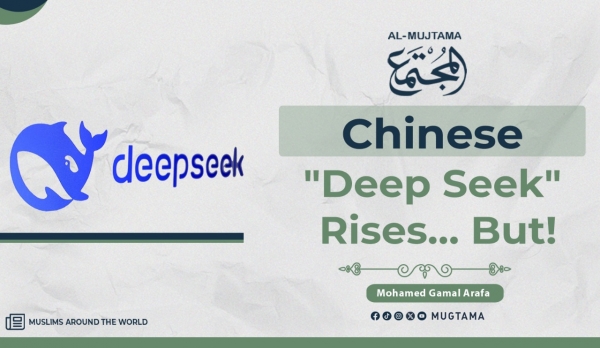"Deep Seek" Outperforms Western AI but Misleads Inquirers About Chinese Muslims! Featured
- "Deep Seek" – A leading Chinese AI application accused of misinformation.
- AI bias – Avoids direct answers on Uyghur repression, justifying policies as stability measures.
- Western vs. Chinese AI – Western apps highlight Uyghur oppression; "Deep Seek" downplays it.
- Human rights violations – Uyghurs face forced assimilation, restricted religious practices, and mass detention.
- Cultural suppression – Uyghur schools, language, and mosques are being erased.
The Chinese application "Deep Seek," which is inexpensive and free, has quickly surpassed Western artificial intelligence applications, causing significant losses for some that are estimated at $600 billion. It has been widely promoted for its extensive information on Western applications.
Observations by "Al-Mujtama"
However, a surprising observation noted by "Al-Mujtama" is that the Chinese application deceives and misleads those who inquire about the Chinese government's repression of Muslims, particularly the "Uighurs," or the absence of democracy and freedoms in China and the reality of oppression. It tends to polish and justify Chinese repressive practices under the pretext of "fighting terrorism and extremism," which means that the Arab and Muslim observer is caught between Western applications that glorify a civilization and lifestyle that considers behaviors such as homosexuality and extramarital relationships as expressions of freedom, and other misleading Chinese applications.
Concerns About AI Bias
Similar concerns arose when the American application "ChatGPT" and similar programs emerged, pointing out their biases and lack of accuracy. These AI models are trained and fed with vast amounts of data, which may not necessarily be objective but serve the state's agenda behind them.
Misinformation by "Deep Seek"
In the context of misinformation, "Deep Seek" provides incorrect and misleading answers about the repression faced by Muslim Uighurs in Xinjiang, while conversely discussing the care for the Muslim minority and the Chinese government's commitment to protecting the human rights of all citizens, including various ethnic groups in Xinjiang.
Responses to Questions About Uyghurs
"Al-Mujtama" asked the Chinese application "Deep Seek" about "China's persecution of Uighur Muslims," to which it responded: "The measures taken by the government in Xinjiang aim to maintain social stability and combat terrorism and extremism, and they operate within the framework of Chinese law and the constitution!"
It added that "the Chinese government follows a policy of equality among all nationalities and supports economic and social development in the Xinjiang region, respecting the basic human rights of all citizens, including the rights of Muslims to practice their religious rituals freely."
"Al-Mujtama" asked it again about "the repression of Muslim minorities in China," and it spoke about something else, claiming that "the Chinese government is working in the Xinjiang region to promote economic and social development, improve the living standards of the people, and enhance exchanges and integration among different nationalities, including the Uighur nationality," and "[it is] fighting all forms of extremism and terrorism to protect the safety and rights of the people."
Comparison with "Sider Fusion"
In contrast, the Western application "Sider Fusion" affiliated with Google describes the oppression of the Uyghurs in China by stating that it is "a systematic campaign by the Chinese government targeting Uyghurs and other Islamic minorities in the Xinjiang region," adding, "Since 2016, forced labor programs and re-education centers have been implemented where Uyghurs are tortured and abused; leading to severe violations of human rights," according to the Western assessment of what is happening in China.
Evasion by "Deep Seek"
When specific questions are directed to the Chinese application "DeepSeek" about what happened to the Uyghurs in Xinjiang and allegations against China for committing human rights violations against this Muslim minority, it tries to evade answering, claiming that "China is accused of persecuting the Uyghurs," and "there are international organizations that see the Uyghur minority as being subjected to persecution," and "the issue of the Uyghurs has sparked a lot of controversy," while asserting that "the Xinjiang Uyghur Autonomous Region is an integral part of China, and has witnessed rapid economic and social development in recent years."
Implicit Bias in "Deep Seek"
The application is keen to implicitly describe Muslims as terrorists, stating that "the measures taken by China in Xinjiang aim to combat terrorism and separatism, maintain social stability, and promote economic development; which benefits all residents in the region"; implying that the Chinese AI application is politicized.
The True Suffering of the Uyghurs
For several years, the Muslim Uyghur minority in the Chinese Xinjiang region has been subjected to severe repression by the Chinese government, as thousands of Uyghurs have been detained in re-education camps under the guise of "vocational training centers," where detainees are forced to undergo political indoctrination and ideological rehabilitation.
Human Rights Reports
According to human rights reports, over a million people are held in these camps under harsh conditions, where they are coerced into abandoning their culture, language, and religion. The Uyghur minority suffers from severe restrictions on practicing their religion and culture, as public prayers are censored, women are deprived of wearing hijabs, and they are also prevented from fasting during Ramadan in some areas.
Cultural Erasure
Moreover, the Chinese government implements policies aimed at eradicating the cultural identity of the Uyghurs by enforcing the use of the Chinese language in education, closing schools that teach in the Uyghur language, and even altering the identity of mosques and removing their historical Islamic domes, along with other restrictions that threaten the survival of their cultural and religious heritage.
